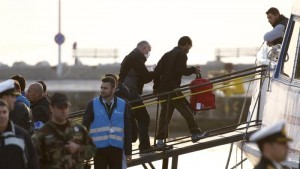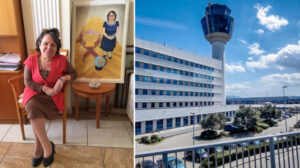In the early morning of May 24, a Turkish journalist fleeing a long prison sentence at home crossed the river dividing Greece and Turkey and claimed asylum in a police station on the other side.
A few hours later, according to two human rights organizations, the journalist, Murat Capan, was still in police custody — but back in Turkey, having been forced to return at gunpoint.
The Greek government denies that account, by the Hellenic League for Human Rights and the International Federation for Human Rights, which say that twice in the last few weeks, on May 24 and June 2, Turks fleeing persecution have been shipped back to their country.
The Hellenic League documented a total of 17 forcible deportations, or pushbacks, including those of seven children.
The pushbacks followed a pattern, according to the league. The Greek police drove the asylum seekers in a van to a meeting point where they were handed over to masked armed men. These men then forced the refugees onto a boat that was sent across the Evros River to Turkey.
The Office of the United Nations High Commissioner for Refugees said on Thursday that it was “deeply concerned” about the allegations.
Similar episodes have long been reported along the border but were not thought to have systematically singled out Turks.
According to figures the Greek government issued on Thursday, more than 200 Turks have been allowed to seek asylum in Greece after crossing the Evros since the start of the year.
But rights activists are concerned that the government may now be focused on sending back Turkish asylum seekers.
“We have a change in pattern here,” Kleio Papapantoleon, the head of the Hellenic League, said in an interview.
More than 140,000 people have been fired or suspended from their jobs since a failed coup in Turkey last summer, mostly on suspicion of connection to a Muslim preacher whom the government accuses of plotting the military revolt. About 45,000 people have been arrested, including at least 120 journalists.
Mr. Capan, managing editor of a political magazine called Nokta, was arrested as soon as he was returned to Turkey, where he had been sentenced to 22 and a half years. He was convicted on terrorism charges related to two magazine covers from 2015 that criticized President Recep Tayyip Erdogan.
One showed a doctored image of Mr. Erdogan gleefully taking a selfie in front of the coffin of a Turkish soldier. The other presented Mr. Erdogan’s victory in the presidential election later that year as an event that would lead to civil war.
Ms. Papapantoleon’s group fears that the deportations of Mr. Capan and other Turks constitute an effort by Greek officials to placate their Turkish counterparts, who were incensed by an earlier refusal to deport eight Turkish airmen who fled to Greece the day after the failed coup.
The Greek government was unable to deport the soldiers because of a ruling by its supreme court, causing a small diplomatic rift between the countries. In a move seen as a response, a boat with Turkish soldiers sailed provocatively close to a pair of Greek islands that Turkey had long claimed as its own.
The recent pushbacks may be a way of avoiding more trouble, Ms. Papapantoleon argued.
“What I think this is is an attempt to override the judicial system through refoulement,” she said, using the legal term for forcible deportation. “I don’t know if it’s a deal under the table or if it’s a pattern that the Greek government is developing to show to the Turkish government that it’s O.K., we will help you.”
Asked about the reports, a Greek government spokesman said on Thursday that “no refoulement has ever been either executed or authorized by the Greek authorities.” He added, “Any allegations implying something different are always investigated.”
Ask me anything
Explore related questions





